Draw a Circle of Radius 3.4 Cm and Centre E
Maharashtra Land Board Class 10 Maths Solutions Chapter 4 Geometric Constructions Trouble Set 4
Question 1.
Select the correct alternative for each of the following questions.
i. The number of tangents that tin can be drawn to a circle at a indicate on the circle is ______
(A) 3
(B) 2
(C) 1
(D) 0
Answer:
(C)
2. The maximum number of tangents that can exist drawn to a circumvolve from a bespeak outside information technology is ______
(A) 2
(B) 1
(C) 1 and but ane
(D) 0
Respond:
(A)
iii. If ∆ABC ~ ∆PQR and \(\frac { AB }{ PQ } \) = \(\frac { 7 }{ 5 } \), then ______
(A) AABC is bigger.
(B) APQR is bigger.
(C) both triangles will exist equal
(D) can not exist decided
Reply:
(A)
Question 2.
Depict a circle with eye O and radius 3.v cm. Take bespeak P at a distance five.7 cm from the centre. Draw tangents to the circumvolve from point P.
Solution:
Analysis:
Every bit shown in the figure, permit P be a point in the outside of circumvolve at a distance of 5.7 cm.
Let PQ and PR be the tangents to the circle at points Q and R respectively.
∴ seg OQ ⊥ tangent PQ …[Tangent is perpendicular to radius]
∴ ∠OQP = 90°

∴ bespeak Q is on the circle having OP every bit diameter. …[Angle inscribed in a semicircle is a right angle]
Similarly, point R too lies on the circle having OP equally diameter.
∴ Points Q and R lie on the circle with OP as diameter.
On drawing a circle with OP as diameter, the points where information technology intersects the circle with center O, will exist the positions of points Q and R respectively.
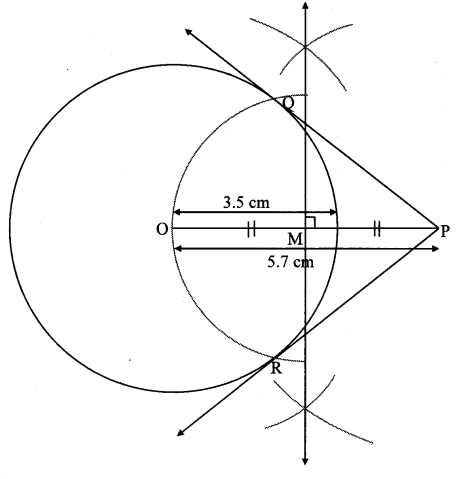
Question 3.
Draw whatever circumvolve. Have whatsoever signal A on it and construct tangent at A without using the centre of the circumvolve.
Solution:
Analysis:
Equally shown in the figure, line l is a tangent to the circle at point A.
seg BA is a chord of the circle and ∠BCA is an inscribed angle.
By tangent secant bending theorem,
∠BCA = ∠BAR
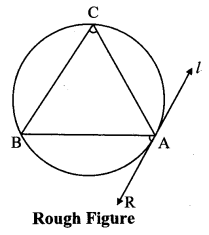
By converse of tangent secant angle theorem,
If nosotros depict ∠BAR such that ∠BAR = ∠BCA, and so ray AR (i.e. line fifty) is a tangent at point A.

Question four.
Draw a circle of bore 6.iv cm. Have a point R at a distance equal to its diameter from the eye. Draw tangents from indicate R.
Solution:
Diameter of circle = 6.4 cm 6.4
Radius of circle = \(\frac { 6.four }{ two } \) = iii.2 cm
Analysis:
As shown in the effigy, permit R be a point in the exterior of circumvolve at a altitude of 6.4 cm.
Let RQ and RS be the tangents to the circle at points Q and Due south respectively.

∴ seg PQ ⊥tangent RQ …[Tangent is perpendicular to radius]
∴ ∠PQR = 90°
∴ point Q is on the circle having PR as diameter. …[Angle inscribed in a semicircle is a right bending]
Similarly,
Point South also lies on the circumvolve having PR every bit bore.
∴ Points Q and S lie on the circle with PR equally diameter.
On drawing a circle with PR as bore, the points where it intersects the circle with centre P, volition exist the positions of points Q and Southward respectively.
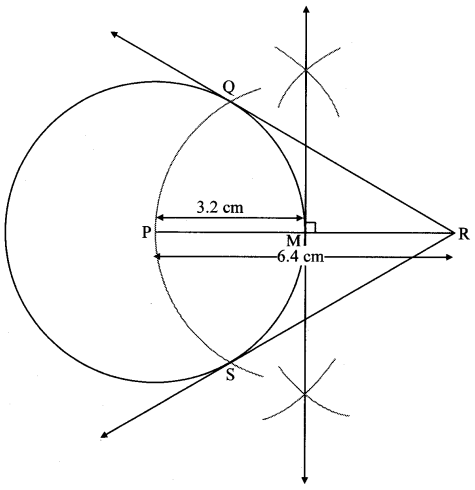
Question 5.
Describe a circle with centre P. Draw an arc AB of 100° measure. Draw tangents to the circle at point A and point B.
Solution:
m(arc AB) = ∠APB = 100°
Analysis:
seg PA ⊥ line l
seg PB ⊥line m … [Tangent is perpendicular to radius]

The perpendicular to seg PA and seg Pb at points A and B respectively will requite the required tangents at A and B.

Steps of construction:
i. With centre P, draw a circle of any radius and take any indicate A on it.
ii. Draw ray PA.
iii. Draw ray PB such that ∠APB = 100°.
iv. Describe line 50 ⊥ray PA at bespeak A.
v. Draw line m ⊥ ray Atomic number 82 at point B.
Lines l and 1000 are tangents at points A and B to the circumvolve.
Question vi.
Describe a circle of radius three.iv cm and centre E. Take a point F on the circle. Take another bespeak A such that East – F – A and FA = four.1 cm. Draw tangents to the circle from bespeak A.
Solution:
Analysis:
Draw a circle of radius three.4 cm
As shown in the figure, let A be a signal in the outside of circle at a distance of (3.4 + 4.1) = vii.five cm.
Let AP and AQ be the tangents to the circle at points P and Q respectively.
∴ seg EP ⊥ tangent PA … [Tangent is perpendicular to radius]
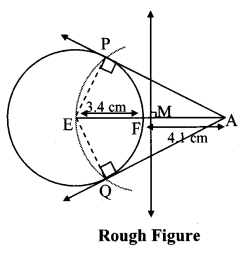
∴ ∠EPA = xc°
∴ point P is on the circle having EA equally diameter. …[Bending inscribed in a semicircle is a correct angle]
Similarly, point Q likewise lies on the circle having EA as bore.
∴ Points P and Q lie on the circumvolve with EA as bore.
On drawing a circle with EA as diameter, the points where information technology intersects the circumvolve with centre Due east, will be the positions of points P and Q respectively.
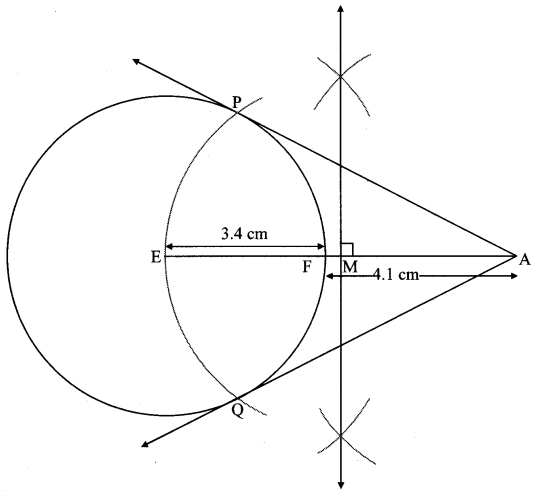
Question 7.
∆ABC ~ ∆LBN. In ∆ABC, AB = five.one cm, ∠B = 40°, BC = four.8 cm, \(\frac { AC }{ LN } \) = \(\frac { iv }{ 7 } \). Construct ∆ABC and ∆LBN.
Solution:
Assay:
As shown in the figure,
Let B – C – N and B – A – L.
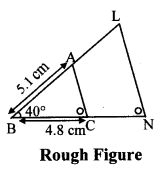
∆ABC ~ ∆LBN …[Given]
∴ ∠ABC ≅ ∠LBN …[Respective angles of similar triangles]
\(\frac { AB }{ LB } \) = \(\frac { BC }{ BN } \) = \(\frac { AC }{ LN } \) …(i)[Corresponding sides of similar triangles]
But. \(\frac { Air-conditioning }{ LN } \) = \(\frac { 4 }{ 7 } \) …(ii)[Given]
∴ \(\frac { AB }{ LB } \) = \(\frac { BC }{ BN } \) = \(\frac { Ac }{ LN } \) = \(\frac { 4 }{ seven } \) …[From(i)and(two)]
∴ sides of ∆LBN are longer than corresponding sides of ∆ABC.
∴ If seg BC is divided into four equal parts, so seg BN will be 7 times each office of seg BC.
So, if we construct ∆ABC, bespeak N volition be on side BC, at a distance equal to 7 parts from B.
Now, signal 50 is the point of intersection of ray BA and a line through Northward, parallel to AC.
∆LBN is the required triangle similar to ∆ABC.

Steps of construction:
i. Depict ∆ABC of given measure. Describe ray BD making an acute angle with side BC.
2. Taking convenient distance on compass, marking seven points Bi, Btwo, B3, B4, B5, B6 and B7 such that
BB1 = B1B2 = BiiB3 B3= B4four = B4B5 = BvB6 = Bhalf-dozenBseven.
iii. Join B4C. Draw line parallel to BfourC through Bseven to intersects ray BC at N.
iv. Draw a line parallel to side AC through Due north. Name the point of intersection of this line and ray BA as Fifty.
∆LBN is the required triangle similar to ∆ABC.
Question eight.
Construct ∆PYQ such that, PY = six.3 cm, YQ = seven.2 cm, PQ = v.viii cm. If = \(\frac { YZ }{ YQ } \) = \(\frac { 6 }{ five } \) then construct ∆XYZ similar to ∆PYQ.
Solution:

Assay:
As shown in the figure,
Let Y – Q – Z and Y – P – Ten.
∆XYZ ~ ∆PYQ …[Given]
∴ ∠XYZ ≅ ∠PYQ …[Corresponding angles of like triangles]
\(\frac { XY }{ PY } \) = \(\frac { YZ }{ YQ } \) = \(\frac { XZ }{ PQ } \) …(i)[Respective sides of like triangles]
Merely, \(\frac { YZ }{ YQ } \) = \(\frac { 6 }{ 5 } \) ,..(two)[Given]
∴ \(\frac { XY }{ PY } \) = \(\frac { YZ }{ YQ } \) = \(\frac { XZ }{ PQ } \) = \(\frac { 6 }{ 5 } \) …[From (i) and (ii)]
∴ sides of ∆XYZ are longer than corresponding sides of ∆PYQ.
∴ If seg YQ is divided into five equal parts, and then seg YZ volition be 6 times each part of seg YQ.
So, if nosotros construct ∆PYQ, point Z will exist on side YQ, at a distance equal to 6 parts from Y.
Now, point X is the betoken of intersection of ray YP and a line through Z, parallel to PQ.
∆XYZ is the required triangle similar to ∆PYQ.

Steps of structure:
i. Draw ∆ PYQ of given measure. Describe ray YT making an astute bending with side YQ.
ii. Taking convenient distance on compass, mark 6 points Y1, Y2, Y3, Y4, Yv and Yhalf-dozen such that
YYane = Y1Yii = YiiYiii = Y3Yfour = YfourYv = Y5Y6.
iii. Join Y5Q. Draw line parallel to Y5Q through Yhalf dozen to intersects ray YQ at Z.
iv. Draw a line parallel to side PQ through Z. Name the point of intersection of this line and ray YP as X.
∆XYZ is the required triangle like to ∆PYQ.
Maharashtra Board Form 10 Maths Solutions
Source: https://www.learncram.com/maharashtra-board/class-10-maths-solutions-part-2-chapter-4-problem-set-4/
Publicar un comentario for "Draw a Circle of Radius 3.4 Cm and Centre E"